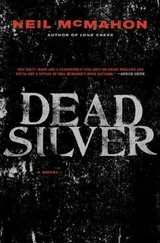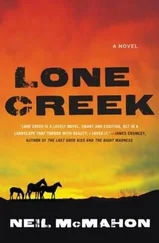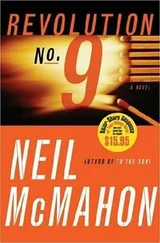"That's somewhat distorted," Monks said.
"He wanted to know what we knew about it. I told him it was the first we'd heard of it."
"Sorry to put you in an awkward spot."
"Will you tell me why you think that, about Eden?" she said.
"I don't think it. It's just a possibility."
"What if I told you – this sounds crazy – what if I said I've been thinking about it, too? It won't go away."
Monks pushed aside everything else that was running through his head.
"You must have a reason," he said.
"It's one of those things I feel."
"Like you just did with me?"
"Like that, yes. But – I don't know exactly how to put it. It's almost like it's a different color, except it's not a color at all. With you, it was pain and anger. This is hate. Someone who wanted her gone."
Monks was not as skeptical as he would have been a few minutes earlier.
"Who?" he said.
"I don't want to plant anything in your mind. I'd rather have you come watch – this person – for yourself. If you notice something, too, then I won't think I'm crazy."
"I'm the farthest thing from psychic, Gwen." Although Monks had often noticed that he had an uncanny ability to make stoplights turn red just as he got to them.
"You don't need to be," she said. "I'm talking about a possessiveness you can see. It's creepy."
Possessiveness of whom? Monks wanted to ask. Why did you tell me that Julia didn't know Eden? Did you know about Eden's affair with D'Anton?
But she had gone from hostile to friendly to offering information. He decided to let her keep moving at her own pace, at least until the time came when it might be necessary to push.
"All right," he said. "Where do I see it?"
"Welles and Julia host events." She pronounced the word like it began with a capital E. "Like parties, but more – focused. There's going to be one tomorrow night. Will you be my date?"
It seemed that there was not going to be any mourning period for Eden at the D'Anton household.
"I'd be honored," Monks said.
"Will it feel awkward to you? Being with a woman who's – well, you know. Been exposed a lot."
"My guess is I'll like it fine."
"You do say the right things," she said, and now her tone was sultry. "Let me give you directions."
He got a pen and wrote them down. The place was near the Marin coast, south of him – a private, very choice area of real estate.
"My God, I hope it cools down," she said. "I'm beaded all over with sweat. What about you?"
"It's actually not bad here. I'm up in the redwoods."
"I meant, is there anyone you suspect?"
"Everyone," Monks said.
She laughed. "You must stay very busy. I'll see you tomorrow, Carroll."
Monks put down the phone, still trying to process what had just happened. The guns lying on the picnic table brought back the enormously different reality of a few minutes before. He felt like he had been walking down the hall to a familiar room, but suddenly found himself in another city. Abruptly, he feared it might be the onset of a malaria attack. But they almost never came anymore, and he had not felt any warning symptoms.
He tasted his drink. It had gotten watered from melting ice. He dumped it over the railing, went inside, and poured another one. The vodka bottle was past the half-empty point.
When he walked back out, a man's voice said, "Doc?"
Monks jerked around, spilling the drink.
"Hold your fire," the voice said. "It's Emil."
"Emil," Monks said, opening his arms expansively. "Come on up."
The voice's owner came into view, a thickset grizzled man in his late sixties. This was Emil Zukich, a neighbor from a couple of miles up the road, the master mechanic who had given Monks the Bronco, then rebuilt it when it had been savaged by gunshots.
"I didn't see your lights," Monks said.
"Mrs. Fetzer called me about some shooting down here. Thought maybe I'd better come in quiet."
Shame touched Monks. Mrs. Fetzer was his closest neighbor, a reclusive middle-aged widow. He had not considered that the shooting might alarm her or drag Emil out to check on him.
"Everything's fine," Monks said. "Just a little target practice."
"Target practice? This time of night?"
"I've got some fine vodka."
I can't stay. How about if I help you put those away?" Emil nodded toward the guns.
Monks was suddenly very tired. He walked to a chair and sat down heavily. "I'm sorry, Emil," he said.
"I ain't going to ask if you're all right, 'cause I can see you're not. That's a bad mix, Doc. Booze and guns."
"I know."
"Maybe I should take them with me."
"I'm all right now."
I'll just check them, then."
Emil cleared the weapons one at a time, making sure they were unloaded, not forgetting to open the Beretta's chamber. A Korean War vet, he had fought at Pork Chop Hill. When he finished, he put them back on the table.
"Anything I can do?" Emil said.
"No. I just need some sleep. Sorry again."
"Not to worry. Things can get that way, I know." Emil faded into the night like a bandit.
It came home to Monks, with force, that he was alone again.
He went into the kitchen and swilled vodka from the bottle. It was warm and its fine flavor was lost to his taste, but he drank it anyway. He pulled food from the refrigerator, salami and cheese and bread, and tore off chunks with his teeth, aware as he bolted it down that he was ravenous.
When his belly was quiet, he made his way down the hall, lurching a little. He stopped in the bathroom to urinate and brush his teeth. Then he fell into bed.
As he reached to turn out the light, his gaze was caught by an illustration in an open book on his nightstand, a work of medieval history. Martine had probably read in it last night, while her deadbeat lover slept on the couch. The picture was an old woodcut by Durer. Several women in a rustic kitchen, surrounded by leering imps and familiars, were brewing a cauldron of magical potion, then flying up the chimney to join the hordes of their sisters, riding their broomsticks through the turbulent moonlit sky to a Walpurgisnacht orgy.
The witchcraft terror had exercised a tremendous hold on the medieval imagination. In Europe, between about 1300 and 1700, tens of thousands, almost all women – some estimates put the number at over a million – were executed for this ultimate heresy, selling their souls to the powers of evil, joining forces with the enemy of mankind.
In practice, beneath the genuine superstition of the times, there were far more tawdry motivations at work: misogyny, cruelty, and greed. The elderly, eccentric, and deformed – offensive to righteous citizens and helpless to defend themselves – were often targeted. But being young and pretty could be dangerous, too. A man suffering from unrequited lust might decide that this could only be because the desired one had cast a spell on him, and have the revenge of seeing her punished for rejecting him. Someone who coveted a neighbor's property might swear that they had seen that neighbor make unexplained trips into the forest at night; the victim's possessions would be confiscated, and given or sold cheaply to the accuser. Many suffered, as at Salem, from the lies of spiteful children.
Once the victims were accused, they were guilty until proven innocent, which almost never happened. Typically, they were tortured into confessing whatever lurid scenarios their inquisitors dreamed up, then burned alive. They were also forced to implicate others, so the process mushroomed. Villages were decimated; victims' entire families were considered contaminated; children were tortured into accusing their parents, then burned along with them. It was all done with the utmost piety.
There was evil in the world, Monks had no doubt of that – pervading human life, in different guises, in every era. During the witch-hunts, it had worn the judges' robes.
Читать дальше











